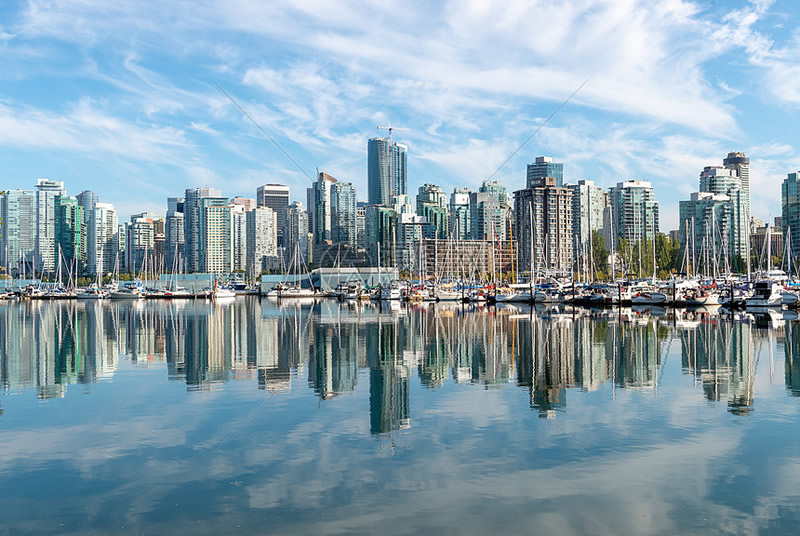
Vancouver renters were already shelling out more per month than in any other market in Canada, and a recent report suggests it's even worse this year than last.
A national report from Rentals.ca suggested new tenants in the city were paying their landlords an average of $2,239 per month for a one bedroom apartment in February, up 14.7 per cent year over year.
For two-bedroom units, landlords were looking for $3,050 per month, up 17.62 per cent from what was asked for in listings posted in February 2021.
Looking at the average rent and annual change in rent for condo and apartment listings in Vancouver, the increase was even more significant. The going rate this February was 23 per cent higher than in the same month last year, according to Rentals.ca data.
Those behind the report said the Vancouver area saw the highest annual change in rent across Canada. Victoria came in second, with an increase of 22 per cent.
Part of the reason the change was so significant this year is that there were actually rent declines in both markets in February 2021.
These figures are calculated based on current listings, meaning they apply to those entering new leases, not those who've been renting long-term. Under provincial legislation, rent increases that take effect this year can only be up to 1.5 per cent.
But when those tenancies end – if a renter is moved out or evicted – a landlord can rent the unit at any amount they choose.
The news is likely not a surprise to anyone who's had to find a rental unit in either area, and it backs up a report released in February from the Canada Mortgage and Housing Corporation that found the market that has long been one of Canada's most expensive is also one of the least accessible.
As for why it costs so much, and why the rates continue to rise, there are a variety of factors at play.
Among them, there's the fact that British Columbia's population is growing faster than that of any other province. Rising inflation is also pushing up rental rates.
The issue of supply and demand, too, continues to increase what landlords can ask for and expect to receive.
"The rental market is absolutely insane right now," Oakwyn Realty's Jeff Francis said in an interview with CTV News Monday, during which he noted that there are efforts underway to change that.
"The City of Vancouver's definitely doing rental-focused buildings, approving those, but at the same time, when you're waiting for 18-plus months to get an approval, you're looking at three to four years before you can actually get people in these units."
Some say those new builds may not even make much of a difference when it comes to affordable housing.
"The units that are coming onto the market are not affordable. They are priced at significantly above existing rents, and that drags the average up," said Robert Patterson, a lawyer and legal advocate with Tenant Resource and Advisory Centre.
In Patterson's opinion, this points to "flaws in our eviction process" and a lack of legal protections for tenants going through it. He said there are a number of "common sense changes" that could be made at the Residential Tenancy Branch level to prevent some types of evictions, which are often disguised ways for a landlord to kick a tenant out so they can get more cash from the next renter.
An example of this from Patterson is a claim that a family member is moving in.
"Renovictions" are also an issue in B.C., though measures have been taken, including in Vancouver, to put an end to the process of landlords looking to turn a quick profit by kicking tenants out and making small changes, then charging more.
"Every day in Vancouver we see a new record is smashed that makes us have to rethink what is realistic for the housing market," Patterson said.
"Because housing is such a core human need, and unfortunately there are people out there willing to take advantage of that from people who are in desperate need of housing."
And while the cost of rent continues to climb, wages have largely stayed the same for many renters, meaning many are being forced to move out of the city.
Tenant Lydia Desrochers, who makes $17 an hour, spoke to CTV News Tuesday about the challenge, and what's available in other markets outside of the area.
"I'm studying and working part-time, and my rent ends up being more than half of what I make," Desrochers said.
"You can find pretty decent studios for $700 a month (in Montreal) for yourself, in a nice neighbourhood."
For some, even those working full-time, moving away may be the only option for now, as experts predict the rates in Vancouver will only continue to rise.
In terms of a solution, those who spoke to CTV News said all levels of government would need to work together before the rates become unsustainable.
Solutions would have to include measures that acknowledge real estate costs are also high in the city, and landlords would need to make ends meet as well.

Subscribe to our newsletter & always be aware of all the latest updates
Copyright © 2022 Abolire. All rights reserved. Web design